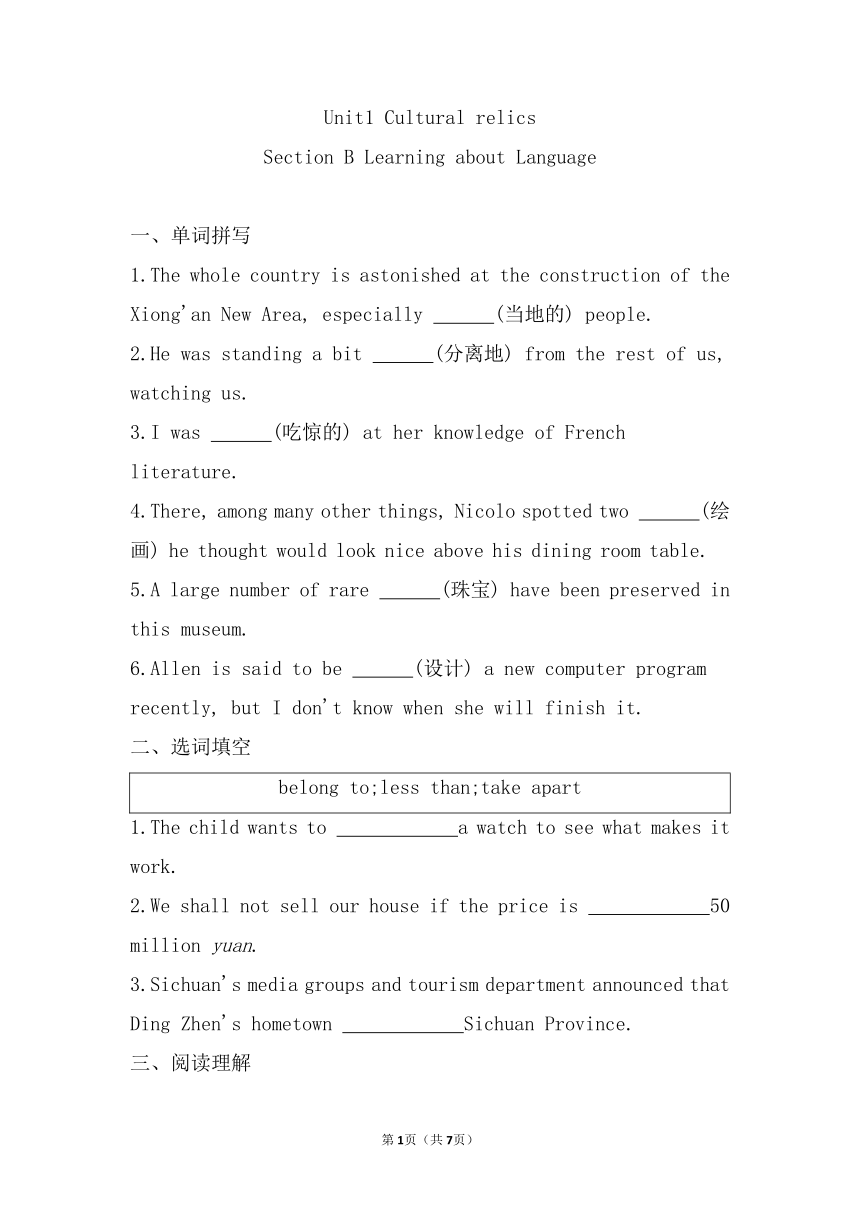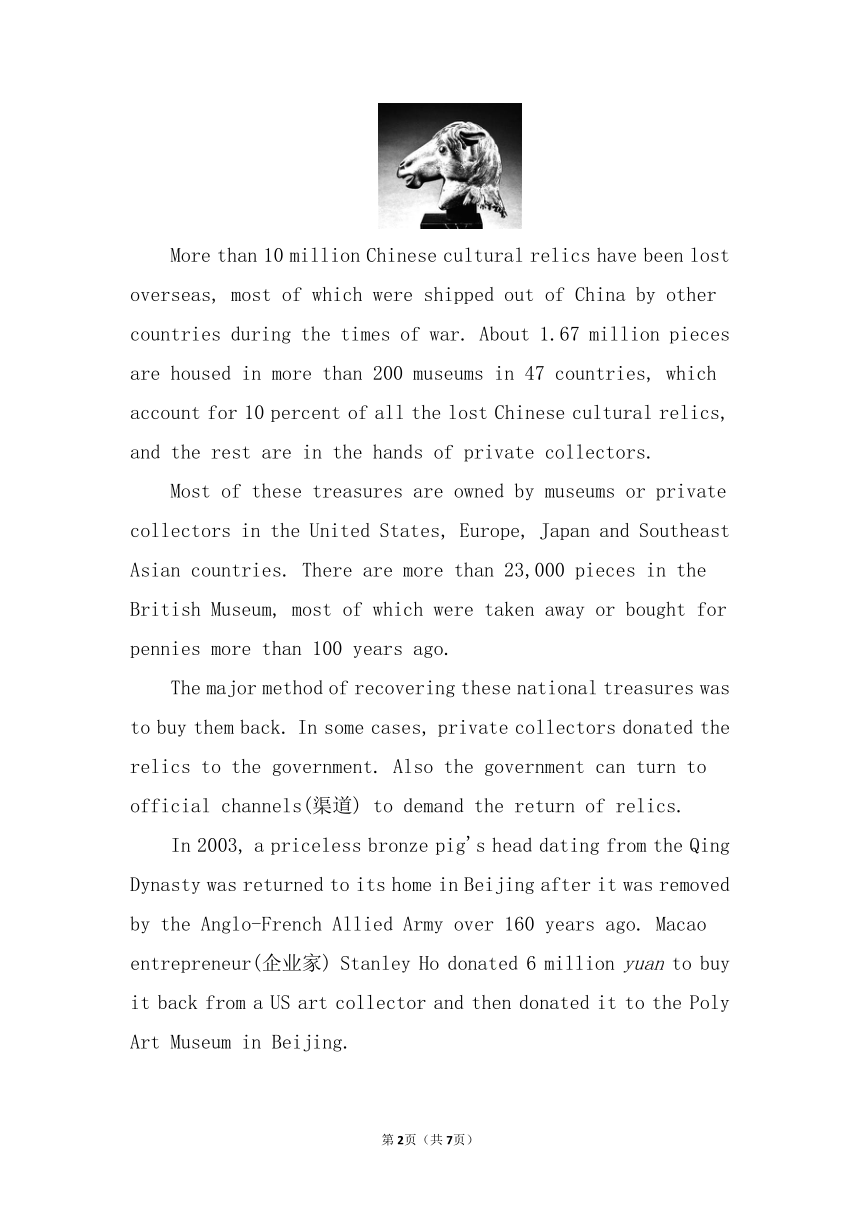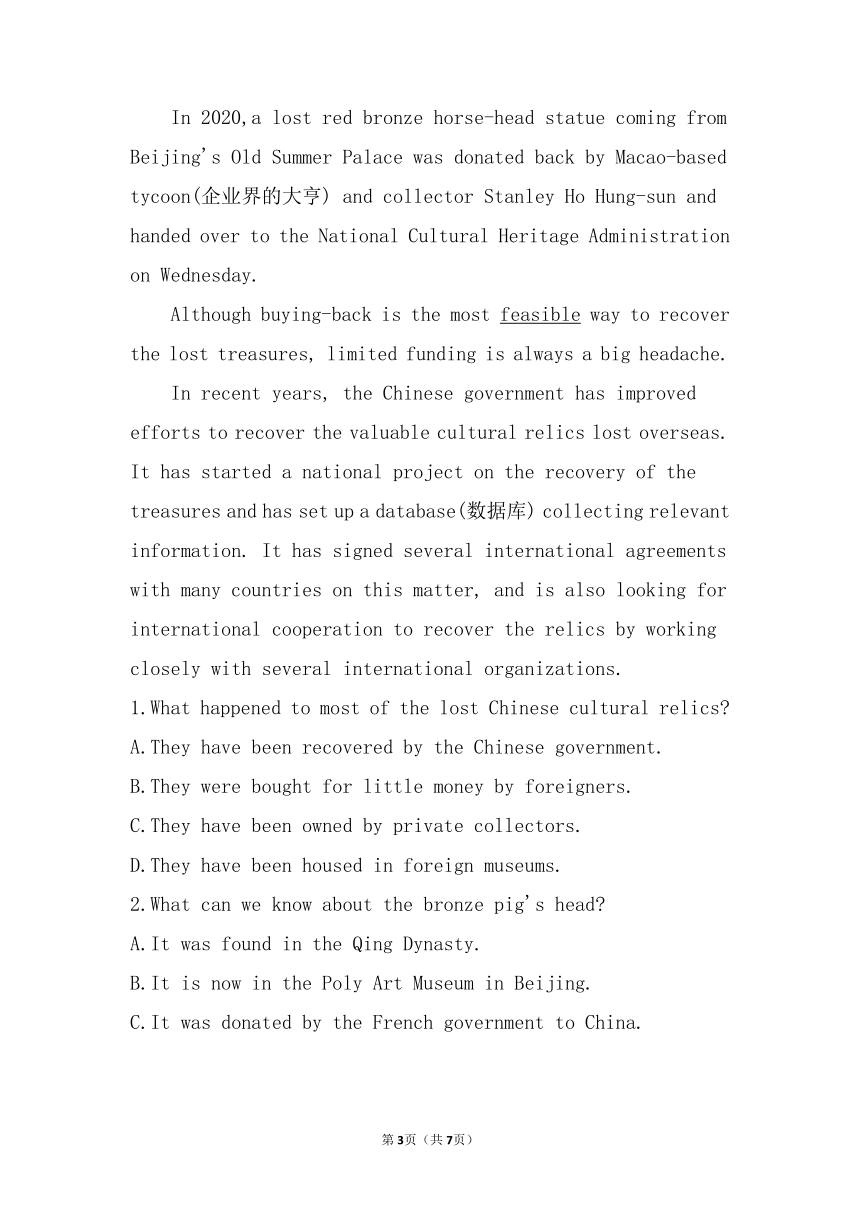人教版必修第二册Unit 1 Cultural relics Section B Learning about Language 同步练习 有答案
文档属性
| 名称 | 人教版必修第二册Unit 1 Cultural relics Section B Learning about Language 同步练习 有答案 |

|
|
| 格式 | zip | ||
| 文件大小 | 122.5KB | ||
| 资源类型 | 教案 | ||
| 版本资源 | 人教版(新课程标准) | ||
| 科目 | 英语 | ||
| 更新时间 | 2021-10-25 16:10:33 | ||
图片预览



文档简介
Unit1 Cultural relics
Section B Learning about Language
一、单词拼写
1.The whole country is astonished at the construction of the Xiong'an New Area, especially (当地的) people.
2.He was standing a bit (分离地) from the rest of us, watching us.
3.I was (吃惊的) at her knowledge of French literature.
4.There, among many other things, Nicolo spotted two (绘画) he thought would look nice above his dining room table.
5.A large number of rare (珠宝) have been preserved in this museum.
6.Allen is said to be (设计) a new computer program recently, but I don't know when she will finish it.
二、选词填空
belong to;less than;take apart
1.The child wants to a watch to see what makes it work.
2.We shall not sell our house if the price is 50 million yuan.
3.Sichuan's media groups and tourism department announced that Ding Zhen's hometown Sichuan Province.
三、阅读理解
More than 10 million Chinese cultural relics have been lost overseas, most of which were shipped out of China by other countries during the times of war. About 1.67 million pieces are housed in more than 200 museums in 47 countries, which account for 10 percent of all the lost Chinese cultural relics, and the rest are in the hands of private collectors.
Most of these treasures are owned by museums or private collectors in the United States, Europe, Japan and Southeast Asian countries. There are more than 23,000 pieces in the British Museum, most of which were taken away or bought for pennies more than 100 years ago.
The major method of recovering these national treasures was to buy them back. In some cases, private collectors donated the relics to the government. Also the government can turn to official channels(渠道) to demand the return of relics.
In 2003, a priceless bronze pig's head dating from the Qing Dynasty was returned to its home in Beijing after it was removed by the Anglo-French Allied Army over 160 years ago. Macao entrepreneur(企业家) Stanley Ho donated 6 million yuan to buy it back from a US art collector and then donated it to the Poly Art Museum in Beijing.
In 2020,a lost red bronze horse-head statue coming from Beijing's Old Summer Palace was donated back by Macao-based tycoon(企业界的大亨) and collector Stanley Ho Hung-sun and handed over to the National Cultural Heritage Administration on Wednesday.
Although buying-back is the most feasible way to recover the lost treasures, limited funding is always a big headache.
In recent years, the Chinese government has improved efforts to recover the valuable cultural relics lost overseas. It has started a national project on the recovery of the treasures and has set up a database(数据库) collecting relevant information. It has signed several international agreements with many countries on this matter, and is also looking for international cooperation to recover the relics by working closely with several international organizations.
1.What happened to most of the lost Chinese cultural relics
A.They have been recovered by the Chinese government.
B.They were bought for little money by foreigners.
C.They have been owned by private collectors.
D.They have been housed in foreign museums.
2.What can we know about the bronze pig's head
A.It was found in the Qing Dynasty.
B.It is now in the Poly Art Museum in Beijing.
C.It was donated by the French government to China.
D.It was damaged by the Anglo-French Allied Army over 160 years ago.
3.What does the underlined word “feasible” in Paragraph 6 mean
A.Possible. B.Difficult.
C.Popular. D.Careful.
4.What is the passage mainly about
A.How to recover cultural relics.
B.The efforts to recover Chinese cultural relics.
C.Stanley Ho donated a bronze pig's head to Beijing.
D.Chinese cultural relics were taken away by the Anglo-French Allied Army.
四、阅读七选五
There are many advantages to travelling around the world.Here are a few to think about:
Youwillenjoytheadventure(冒险).
The reason why many people travel is that they love an adventure.There are several different types of adventures to choose from when you travel. 1 Some people enjoy diving(潜水) while others prefer surfing.Wherever you go,you will make the memories of your adventure last a lifetime.You can look back on the enjoyment again and again.
Youwillgettoknowdifferentpeopleandplaces.
The world contains lots of countries and not all people are the same.When travelling,you get the opportunity to meet different people from different places. 2 Travelling and interacting with different people can help build or improve social skills with very little effort.
3
Different cultures are everywhere.Some places have modern cultures while others have traditional customs.Experiencing different cultures can also be educational;many travellers look for places to visit whose cultures are different from their own. 4 It teaches us respect.
Youwillfeelrelaxedaftertravelling.
Stress is a natural part of life.But when we have too much stress in our lives,it can be dangerous to our health. 5 It can be one of the best ways to reduce stress.
A.You will get used to different cultures.
B.You can cheer yourself up through travelling.
C.Some people like travelling to different beaches.
D.Travelling can bring joy to life,especially in stressful times.
E.There are lots of exciting places to experience in the real world.
F.Learning about others’ lives and customs deepens our understanding of the world.
G.One important social skill we can learn is how to communicate with different people.
一、单词拼写
1.local 2.apart 3.amazed 4.paintings 5.jewels 6.designing
二、选词填空
1.take apart 2.less than 3.belongs to
三、阅读理解
1.C 细节理解题。由第一段中的“About 1.67 million pieces are housed in more than 200 museums in 47 countries, which account for 10 percent of all the lost Chinese cultural relics, and the rest are in the hands of private collectors.”可知,约1,670,000件文物被收藏在47个国家的200多个博物馆中,占中国丢失文物总数的10%,其余的都在私人收藏家手中。由此可知大部分丢失的中国文物在私人收藏家手中。故选C。A:中国政府已找到了它们;B:它们被外国人廉价买走了;D:它们被收藏在外国的博物馆里。
2.B 细节理解题。由文章第四段内容尤其是其中的“In 2003, a priceless bronze pig's head...was returned to its home in Beijing”及“Macao entrepreneur...donated it to the Poly Art Museum in Beijing.”可知,2003年,澳门企业家将这尊青铜猪首捐给了北京的保利艺术博物馆,这使它重新回到了祖国。由此可知,这尊青铜猪首现在在北京保利艺术博物馆。故选B。A项中的was found in the Qing Dynasty(在清朝时发现的)、C项中的was donated by the French government(由法国政府捐赠)和D项中的was damaged均与原文不符。
3.A 词义猜测题。由第六段“Although buying-back is the most feasible way to recover the lost treasures, limited funding is always a big headache.”可知,虽然回购是收回丢失的宝物最可行的方法,但有限的资金总是一个令人头疼的问题。由此并结合语境可以判断出,第六段中的“feasible”表示“可行的”,该词可替换为possible“可能的”。故选A。B:困难的;C:受欢迎的;D:仔细的。
4.B 主旨大意题。由第三段中的“In some cases, private collectors donated the relics to the government. Also the government can turn to official channels(渠道) to demand the return of relics.”和第七段中的“In recent years, the Chinese government has improved efforts to recover the valuable cultural relics lost overseas.”可知,在某些情况下,私人收藏家将这些文物捐赠给了政府;政府还可以通过官方渠道要求归还文物;近年来中国政府加大了努力,以收回在海外丢失的珍贵文物。再结合第七段中的具体措施及全文内容可知,这篇文章主要讲的是中国为收回丢失的文物所做的努力。故选B。
四、阅读七选五
1.C 2.G 3.A 4.F 5.D
第9页(共9页)
Section B Learning about Language
一、单词拼写
1.The whole country is astonished at the construction of the Xiong'an New Area, especially (当地的) people.
2.He was standing a bit (分离地) from the rest of us, watching us.
3.I was (吃惊的) at her knowledge of French literature.
4.There, among many other things, Nicolo spotted two (绘画) he thought would look nice above his dining room table.
5.A large number of rare (珠宝) have been preserved in this museum.
6.Allen is said to be (设计) a new computer program recently, but I don't know when she will finish it.
二、选词填空
belong to;less than;take apart
1.The child wants to a watch to see what makes it work.
2.We shall not sell our house if the price is 50 million yuan.
3.Sichuan's media groups and tourism department announced that Ding Zhen's hometown Sichuan Province.
三、阅读理解
More than 10 million Chinese cultural relics have been lost overseas, most of which were shipped out of China by other countries during the times of war. About 1.67 million pieces are housed in more than 200 museums in 47 countries, which account for 10 percent of all the lost Chinese cultural relics, and the rest are in the hands of private collectors.
Most of these treasures are owned by museums or private collectors in the United States, Europe, Japan and Southeast Asian countries. There are more than 23,000 pieces in the British Museum, most of which were taken away or bought for pennies more than 100 years ago.
The major method of recovering these national treasures was to buy them back. In some cases, private collectors donated the relics to the government. Also the government can turn to official channels(渠道) to demand the return of relics.
In 2003, a priceless bronze pig's head dating from the Qing Dynasty was returned to its home in Beijing after it was removed by the Anglo-French Allied Army over 160 years ago. Macao entrepreneur(企业家) Stanley Ho donated 6 million yuan to buy it back from a US art collector and then donated it to the Poly Art Museum in Beijing.
In 2020,a lost red bronze horse-head statue coming from Beijing's Old Summer Palace was donated back by Macao-based tycoon(企业界的大亨) and collector Stanley Ho Hung-sun and handed over to the National Cultural Heritage Administration on Wednesday.
Although buying-back is the most feasible way to recover the lost treasures, limited funding is always a big headache.
In recent years, the Chinese government has improved efforts to recover the valuable cultural relics lost overseas. It has started a national project on the recovery of the treasures and has set up a database(数据库) collecting relevant information. It has signed several international agreements with many countries on this matter, and is also looking for international cooperation to recover the relics by working closely with several international organizations.
1.What happened to most of the lost Chinese cultural relics
A.They have been recovered by the Chinese government.
B.They were bought for little money by foreigners.
C.They have been owned by private collectors.
D.They have been housed in foreign museums.
2.What can we know about the bronze pig's head
A.It was found in the Qing Dynasty.
B.It is now in the Poly Art Museum in Beijing.
C.It was donated by the French government to China.
D.It was damaged by the Anglo-French Allied Army over 160 years ago.
3.What does the underlined word “feasible” in Paragraph 6 mean
A.Possible. B.Difficult.
C.Popular. D.Careful.
4.What is the passage mainly about
A.How to recover cultural relics.
B.The efforts to recover Chinese cultural relics.
C.Stanley Ho donated a bronze pig's head to Beijing.
D.Chinese cultural relics were taken away by the Anglo-French Allied Army.
四、阅读七选五
There are many advantages to travelling around the world.Here are a few to think about:
Youwillenjoytheadventure(冒险).
The reason why many people travel is that they love an adventure.There are several different types of adventures to choose from when you travel. 1 Some people enjoy diving(潜水) while others prefer surfing.Wherever you go,you will make the memories of your adventure last a lifetime.You can look back on the enjoyment again and again.
Youwillgettoknowdifferentpeopleandplaces.
The world contains lots of countries and not all people are the same.When travelling,you get the opportunity to meet different people from different places. 2 Travelling and interacting with different people can help build or improve social skills with very little effort.
3
Different cultures are everywhere.Some places have modern cultures while others have traditional customs.Experiencing different cultures can also be educational;many travellers look for places to visit whose cultures are different from their own. 4 It teaches us respect.
Youwillfeelrelaxedaftertravelling.
Stress is a natural part of life.But when we have too much stress in our lives,it can be dangerous to our health. 5 It can be one of the best ways to reduce stress.
A.You will get used to different cultures.
B.You can cheer yourself up through travelling.
C.Some people like travelling to different beaches.
D.Travelling can bring joy to life,especially in stressful times.
E.There are lots of exciting places to experience in the real world.
F.Learning about others’ lives and customs deepens our understanding of the world.
G.One important social skill we can learn is how to communicate with different people.
一、单词拼写
1.local 2.apart 3.amazed 4.paintings 5.jewels 6.designing
二、选词填空
1.take apart 2.less than 3.belongs to
三、阅读理解
1.C 细节理解题。由第一段中的“About 1.67 million pieces are housed in more than 200 museums in 47 countries, which account for 10 percent of all the lost Chinese cultural relics, and the rest are in the hands of private collectors.”可知,约1,670,000件文物被收藏在47个国家的200多个博物馆中,占中国丢失文物总数的10%,其余的都在私人收藏家手中。由此可知大部分丢失的中国文物在私人收藏家手中。故选C。A:中国政府已找到了它们;B:它们被外国人廉价买走了;D:它们被收藏在外国的博物馆里。
2.B 细节理解题。由文章第四段内容尤其是其中的“In 2003, a priceless bronze pig's head...was returned to its home in Beijing”及“Macao entrepreneur...donated it to the Poly Art Museum in Beijing.”可知,2003年,澳门企业家将这尊青铜猪首捐给了北京的保利艺术博物馆,这使它重新回到了祖国。由此可知,这尊青铜猪首现在在北京保利艺术博物馆。故选B。A项中的was found in the Qing Dynasty(在清朝时发现的)、C项中的was donated by the French government(由法国政府捐赠)和D项中的was damaged均与原文不符。
3.A 词义猜测题。由第六段“Although buying-back is the most feasible way to recover the lost treasures, limited funding is always a big headache.”可知,虽然回购是收回丢失的宝物最可行的方法,但有限的资金总是一个令人头疼的问题。由此并结合语境可以判断出,第六段中的“feasible”表示“可行的”,该词可替换为possible“可能的”。故选A。B:困难的;C:受欢迎的;D:仔细的。
4.B 主旨大意题。由第三段中的“In some cases, private collectors donated the relics to the government. Also the government can turn to official channels(渠道) to demand the return of relics.”和第七段中的“In recent years, the Chinese government has improved efforts to recover the valuable cultural relics lost overseas.”可知,在某些情况下,私人收藏家将这些文物捐赠给了政府;政府还可以通过官方渠道要求归还文物;近年来中国政府加大了努力,以收回在海外丢失的珍贵文物。再结合第七段中的具体措施及全文内容可知,这篇文章主要讲的是中国为收回丢失的文物所做的努力。故选B。
四、阅读七选五
1.C 2.G 3.A 4.F 5.D
第9页(共9页)
